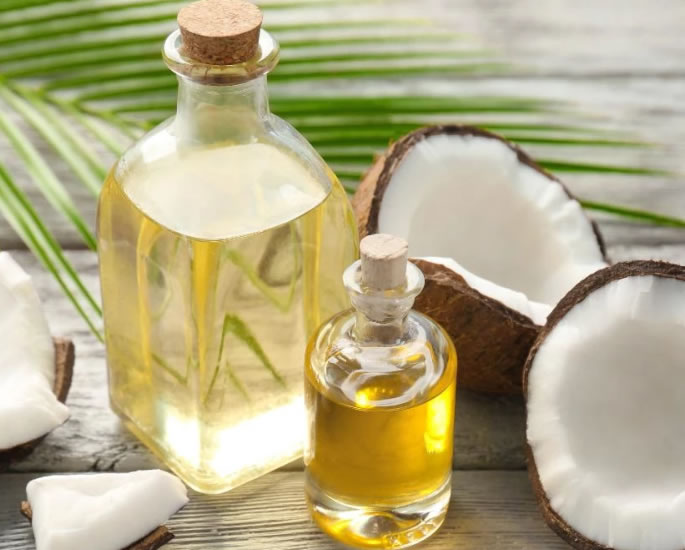People with diabetes should pay attention
When it comes to cooking, many dishes require oil but there are some unhealthy oils to avoid.
According to physician Cate Shanahan, specific vegetable oils are a major cause of health problems in the United States.
During a podcast, she said: “I think vegetable oils are the No. 1 cause of health problems in this country.”
And when it comes to Indian cooking, large amounts of oil are used in dishes that are high in calories.
The combination of high calories and oil consumption can have an adverse effect on the body and could lead to health problems.
With that said, here are 10 unhealthy oils to avoid when cooking.
Coconut Oil

This oil is used in Indian cooking, enhancing the flavour of some dishes.
But it is controversial because it comes to high-heating cooking, coconut oil might be the best choice.
On the other hand, too much can be unhealthy.
Coconut oil – which is sold at room temperature – is approximately 90% saturated fat, although some believe that not all saturated fats are equivalent.
According to Beth Warren, author of Living a Real Life With Real Food:
“This isn’t the same as the saturated fat found in red meat that clogs your arteries.”
Coconut oil has a high amount of medium-chain fatty acids.
But coconut oil may increase your bad LDL cholesterol levels, which could have a negative effect on your heart.
Kimberly Gomer, director of nutrition at the Pritikin Longevity Centre in Miami, says:
“It would be difficult to get your LDL cholesterol into healthy ranges eating a lot of coconut oil.”
Therefore, this oil should be used in moderation within the recommended limits for saturated fat intake.
Palm Oil

Palm oil is composed of roughly equal parts saturated fat and unsaturated fat.
According to Harvard Health Publishing, it is often used in processed foods because it is semisolid at room temperature.
This is not necessarily a bad thing, considering it contains less saturated fat than butter and contains no trans fats.
But palm oil is still an unhealthy oil to avoid when cooking, especially because there are oils with lower levels of saturated fat.
People with diabetes should pay attention to their saturated fat consumption and should avoid the likes of palm oil.
There are also ethical concerns over the use of palm oil as palm oil production has been linked with deforestation and unjust working practices.
Canola Oil

Canola oil is derived from the seeds of the canola plant and contains a good amount of monounsaturated fats and a decent amount of polyunsaturated fats.
However, canola oil is subject to oxidation when heated.
One downside of canola oil is its Omega-6 fat content.
Like Omega-3 fats, Omega-6 fats are essential to health and perform important functions in your body.
However, modern diets tend to be extremely high in Omega-6s — found in many refined foods — and low in Omega-3s from whole foods, causing an imbalance that leads to increased inflammation.
Canola oil is also highly refined as it goes through stages that involve chemical treatment during production.
Refining decreases nutrients in oils, such as essential fatty acids, antioxidants and vitamins.
Grapeseed Oil

Grapeseed oil is often believed to be healthy because it contains high amounts of polyunsaturated fat and Vitamin E.
But this is a misconception as this unhealthy oil contains high levels of Omega-6 fatty acids, which have been found to be linked to inflammation.
While small amounts of Omega-6 fatty acids are encouraged, it is best to consume them in moderation and as part of a diet that includes Omega-3 fatty acids.
Healthline says grapeseed oil boasts “significant amounts of vitamin E. One tablespoon provides 3.9 mg of vitamin E, which is 19% of the RDA (recommended daily allowance)”.
However, many of grapeseed oil’s good effects are overshadowed by its potentially dangerous ones.
Healthline says: “Some grapeseed oils may contain potentially harmful levels of polycyclic aromatic hydrocarbons (PAHs), which are known to cause cancer in animals.”
Although grapeseed oil is an unhealthy oil, if you decide to cook with it, make sure to eat plenty of foods that reduce inflammation, such as fatty fish and nuts.
Soybean Oil

Soybean oil is a type of vegetable oil made from the seeds of the soybean plant.
It is a commonly used oil but because it is hydrogenated, it should be used in moderation.
According to researchers at the University of California – Riverside, there is a connection between soybean oil and neurological disorders like anxiety, depression, autism and Alzheimer’s.
One study compared mice who were fed three different diets – soybean oil, soybean oil modified to be low in linoleic acid and coconut oil.
Researchers found significant effects from the soybean oil on the hypothalamus, the part of the brain responsible for several functions, including metabolism, hormone release and regulating body temperature.
The mice fed the soybean oil had several genes that were not functioning correctly and nearly 100 other genes were affected.
It was suggested that these effects could have consequences for brain health and diseases such as autism and Parkinson’s.
Cottonseed Oil

Cottonseed oil is an unhealthy oil because research has shown that cottonseed products contain natural toxins.
A 2014 report revealed that the biggest concern to note is gossypol, a substance found in the cotton plant.
The report stated: “High concentrations of free gossypol may be responsible for acute clinical signs of gossypol poisoning which include respiratory distress, impaired body weight gain, anorexia, weakness, apathy and death after several days.”
It also linked gossypol to male and female reproductive issues and impaired immune function.
Cottonseed oil is considered to be unhealthy because it is high in saturated fat and low in healthier monounsaturated fat.
But cottonseed oil is a polyunsaturated fat, which can help lower the bad LDL cholesterol and increase the good HDL cholesterol.
But the saturated fat content can have the opposite effect on cholesterol and could increase the risk of heart disease.
Corn Oil

Corn oil is a type of vegetable oil that can be found in everything from margarine to salad dressing.
It is unhealthy as it is high in Omega-6 fatty acids, made from genetically modified (GMO) corn, is highly refined, and can produce harmful chemicals when it is heated.
As a result, corn oil has been associated with increased levels of inflammation and liver damage.
Like other vegetable oils, it is linked to heart disease and obesity.
But corn oil has a high smoke point, which is a reason why it is popular for frying. It can also be used in baking and as an ingredient in some kinds of margarine.
Nevertheless, the refining process can cause corn oil to become oxidised. Because of this, it can increase the risk of developing certain diseases.
Sunflower Oil

Sunflower oil is commonly used in cooking but it is not as healthy as you would think.
Jay Cowin, registered nutritionist and director of formulations for ASYSTEM, says:
“Sunflower oil is unhealthy because it also contains high levels of Omega-6 fatty acids.”
“These fatty acids can cause inflammation in the body, which can lead to health problems such as heart disease and cancer.
“Another reason why sunflower oil can be unhealthy is that it produces higher levels of aldehyde, as compared to other plant-based cooking oils, when exposed to heat.
“Aldehydes are actually toxic substances that can make someone vulnerable to multiple health risks.”
Rice Bran Oil

Rice bran oil is a by-product of rice bran and it has been gaining popularity in Asian countries like India.
It is beneficial in moderation as it is free from trans-fat and contains a number of antioxidants.
But increasing the amount of rice bran oil when cooking could cause stomach discomfort.
Because the oil contains Omega-6 fatty acids, increasing the amount could lead to inflammation.
It may have heavy metals like arsenic, whose prolonged exposure may be dangerous to health.
Rice bran oil may also lower blood calcium levels causing calcium deficiency.
Safflower Oil

Safflower oil comes from the seeds of the safflower plant. It is rich in unsaturated fats and is used in high-heat cooking such as frying.
Like all oils, safflower oil is not a good source of nutrients but it is high in Vitamin E.
But compared to other oils like olive oil, safflower oil can be quite unhealthy.
Some studies suggest that the Omega-6 fat linoleic acid, the primary component of standard safflower oil, may actually harm health when consumed in excess.
A study indicated that excess dietary linoleic acid intake may harm the brain by promoting neuroinflammation.
Although some studies have suggested that safflower oil may help reduce the risk of heart disease by lowering cholesterol, researchers argue that its effects on other aspects of health are less clear and that the current dietary intake of linoleic acid is far too high.
When keeping up with a healthy lifestyle, the type of oil you use when cooking is very important as some are healthier than others.
Oils with more saturated fat are worse so be sure to check.
In addition to using oil, avoid eating too many foods that are made with these oils. Many oils are disguised using alternative names.
Knowing the effects oil can have on the body is important, therefore, pick a healthier option such as olive oil and use in moderation.






























































